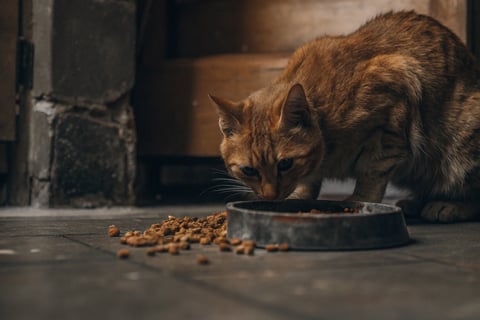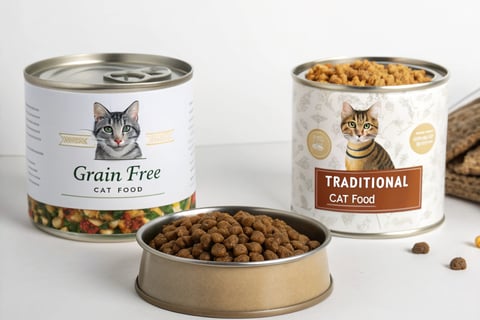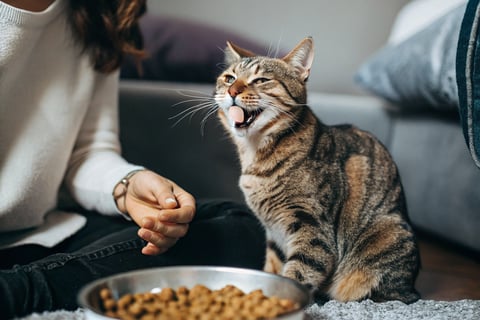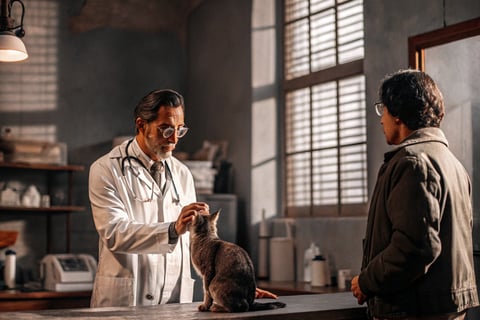Grain-free cat food
"Is grain-free cat food really better for your feline friend? Learn the benefits, risks, and whether it’s the right choice for your cat in this in-depth guide."
1/20/20253 min read
The Truth About Grain-Free Cat Food: Is It Worth It?
In recent years, grain-free cat food has gained immense popularity among pet owners. But is it truly better for your feline friend, or is it just another marketing trend? Understanding what grain-free cat food is, its benefits, and potential drawbacks can help you make an informed decision about your cat’s diet.
What Is Grain-Free Cat Food?
Grain-free cat food is exactly what it sounds like—food formulated without grains such as wheat, corn, rice, or barley. Instead, these products often use alternative carbohydrate sources like potatoes, peas, or lentils.
Why Grain-Free?
Proponents argue that:
Cats Are Obligate Carnivores: Their natural diet in the wild consists mainly of meat, with minimal exposure to grains.
Allergies and Sensitivities: Grain-free options may benefit cats with grain allergies or sensitivities, though these cases are rare.




Learn more "Cat Nutrition Guide for Beginners."
Benefits of Grain-Free Cat Food
Mimics Natural Diet:
Grain-free foods often contain higher protein levels and fewer carbohydrates, closer to what cats would eat in the wild.May Help with Allergies:
Cats with grain allergies may experience relief from skin issues or gastrointestinal problems when switched to grain-free diets.Improved Digestion:
Some cats digest grain-free formulas better, especially if they’re sensitive to fillers like corn or wheat.


Check out FDA: Grain-Free Diets and DCM Investigation.
Potential Risks of Grain-Free Cat Food
No Proven Superiority:
Most cats can digest grains without any issues. Grain allergies are rare, and grain-free diets are not necessarily healthier for most felines.Nutritional Imbalance:
Some grain-free foods rely heavily on plant-based ingredients like peas or lentils, which may not meet all of a cat's nutritional needs.FDA Investigation:
The FDA has investigated a potential link between grain-free diets and dilated cardiomyopathy (DCM) in dogs, with some concerns extending to cats. While more research is needed, it’s worth discussing with your vet.


Learn more "Top Healthy Foods for Cats."
How to Decide if Grain-Free Is Right for Your Cat
Consult Your Veterinarian:
Always speak with your vet before making significant dietary changes, especially if your cat has specific health concerns.Understand Your Cat’s Needs:
Healthy, active cats without food sensitivities generally thrive on balanced diets, whether grain-free or not.
If your cat has allergies, ensure grain-free isn’t just replacing grains with other fillers that may also cause sensitivities.
Read Labels Carefully:
Look for high-quality, protein-rich grain-free options with minimal fillers and added nutrients like taurine.


Check out ASPCA: Understanding Cat Nutrition.
Alternatives to Grain-Free Cat Food
If your cat doesn’t require a grain-free diet, consider:
Limited Ingredient Diets (LID): Designed for cats with allergies, these focus on simple, wholesome ingredients.
High-Protein Formulas: Prioritize protein sources and avoid foods with excessive fillers.
Conclusion: Is Grain-Free Cat Food Worth It?
Grain-free cat food isn’t inherently better or worse than regular food—it depends on your cat’s individual needs. For most cats, grains pose no health risks and provide a good source of energy. However, if your cat shows signs of allergies or sensitivities, a grain-free option may be worth exploring. Always prioritize high-quality, nutritionally complete foods and consult your vet for guidance.
